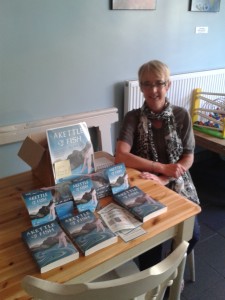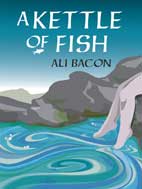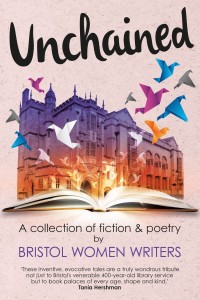Today, I’m delighted to welcome Ali Bacon to my blog. Ali moved to Bristol after graduating from St. Andrews University in the 1970s then worked in libraries of all shapes and sizes (the eagle-eyed might spot a few of them in her fiction) until the writing bug finally bit. Her first novel, A New History of Love, was shortlisted for the A&C Black First Novel Award 2007. Her second, A Kettle of Fish was published on Kindle in 2012 by Thornberry Publishing and also independently as a paperback. Several of her short stories have been published in print and on the web and she is a contributor toUnchained, an anthology celebrating 400 years of libraries in Bristol. Also a blogger and book reviewer, she is grappling with a new novel set in Victorian Edinburgh while penning the occasional rant for a local newspaper.
Q: The protagonist in A Kettle of Fish is eighteen year-old Ailsa. What five words best describe her?
Headstrong, (or reckless!) honest, affectionate, inquisitive, sexy, a dreamer
Q: Where is the book set and how did you decide on its setting?
After a trip ‘home’ to Scotland – which I left 30 years ago – I decided it was time to rediscover my roots, and so the book is set in Fife and Edinburgh. Up to then I had not mined that particular seam but I think it was the right way to go as I’m now writing another Scottish novel. Clearly there’s plenty more to be tapped!
Q: Was your novel inspired by any real life events?
Someone has said a novel is 1/3 the author, 1/3 the people he/she knows and 1/3 entirely made up. I think that is probably not far off the mark with Kettle. However it’s the made-up stuff that drives it – the main characters and plot are entirely fictional. My direct experience provides background, settings, emotional context, maybe a few minor characters.
 Q: What are you working on at the moment?
Q: What are you working on at the moment?
For the last few years I’ve been working on a novel I ‘uncovered’ while writing Kettle. It is the story of a Scottish artist (and early photographer) told by the women who loved him.
Aside: As you know, photography is one of my passions and my novel, I Stopped Time, is my homage to some of the pioneers of photography. I was fascinated to find more detail about Ali’s work in progress here.
For a while I flirted with a non-fiction approach but that ground has been fairly well covered and I’m a novelist at heart, and so a historical novel it is. Unlike Kettle it has involved massive amounts of research into Victorian Edinburgh, the history of the Church of Scotland, early photographic methods and much more besides. But the biggest challenge has been to take a real story and make it into satisfying fiction (it has all the right ingredients) while respecting the history and the characters involved.
Q. When I was discussing historical fiction with Evie Woolmore, she said that here are three kinds of ‘historical novelists’: those who write in order to accurately reconstruct history in fictional or quasi fictional terms (Philippa Gregory or Hilary Mantel); those who write stories whose plot is reliant on and infused with the historical setting and thus which are historically very precise and well-researched (such as Harriet Steel’s novel Salvation, which I recently reviewed); and those (like me) who write novels which are not principally historical but work effectively in historical settings. Do you share that view and, if so, which category do you fall into?
Well it looks as though I fall squarely into category 1 in this case, although I don’t guarantee to keep to this model in the future!
One of your previous interviewees described biography as a ‘found novel’.
I think that was the wonderful Kathleen Jones.
I found it a very helpful concept, in the sense that by ‘reconstructing history’ I have my story ready-made. On the other hand, as a novelist, as I think you have mentioned recently yourself, knowing how a story ends is not the same as knowing how to make it happen, and ‘reconstruction’ is too simplistic a term. The narrative, I think has to be ‘re-engineered’ -? Although that sounds far too mechanistic for the way it actually happens, and hopefully, the end result. I’m talking about things like narrative pace, conflict and tension coming in the right place at the right time. There are also big decisions about what to leave out and where it feels right to tweak what might be known facts. The question is, does fiction serve history or vice versa? I think fiction has to have the final word as long as the spirit of the story is preserved.
Q. Verbal anachronisms have been spotted recently in Downton Abbey and in Ripper Street. There is always a difficulty of striking a balance between getting the ‘feel’ of the language of the era right and borrowing directly from the language of the day. How do you go about this?
In terms of language I’m grappling with geography as well as history. Scottish dialect has fallen out of my everyday speech but it’s in my psyche and so I can’t ignore it. Nor can I think myself back to a form of words neither I nor my readers will recognise. I do think voice is crucial in all novels and the historical novels I particularly admire (Rose Tremain’s Merivel books, or recently Catherine Czerkawska’s The Physic Garden) have managed to get it absolutely right. Of course there is always a danger of inadvertently including an anachronism, but it’s less likely to happen – or perhaps to be noticed – if the voice is convincing. So it can be done, but I’m not sure that there are rules for how to do it and so far I’m working pretty much on gut instinct. If I hear these people in my head (which I do) I hope I can find a way of putting it on the page. My writing group have given me very positive feedback on this so far, although I think there are some things still to be ironed out.
Q: The key trick in writing historical fiction is transporting readers to another time and place without overloading them with historical information. So how much detail is too much?
 I tend to be of the ‘less is more’ school and have admired Tracey Chevalier’s ability to conjure a time and place without telling me every detail of every room or article of clothing. But the conjuring trick will only work when the author knows his/her stuff, so there’s no skipping on the research! I also like to learn about a period through fiction, and detail adds to the experience. It’s all about finding the balance, I suppose, and avoiding the dreaded info-dump, of course.
I tend to be of the ‘less is more’ school and have admired Tracey Chevalier’s ability to conjure a time and place without telling me every detail of every room or article of clothing. But the conjuring trick will only work when the author knows his/her stuff, so there’s no skipping on the research! I also like to learn about a period through fiction, and detail adds to the experience. It’s all about finding the balance, I suppose, and avoiding the dreaded info-dump, of course.
Q: Khaled Hosseini says that he feels he is discovering a story rather than creating it. Are you an avid plotter or do you start with a single idea and let the novel develop organically?
Well you would think that in view of what I’ve just said about narrative that I would be a plotter, but I’m afraid I still have to work all of it out as I go along. It’s the discovering that keeps me going, otherwise I lose interest. I don’t complete the journey of discovery until the first draft is done. This time I have at least resisted the urge to go back and revise early chapters as new ideas emerge, but it’s still a very slow way of writing, and there will be a great deal of rewriting come draft 2 (not to mention 3, 4, …?)
Q: Hilary Mantel says that a Catholic upbringing is the only qualification a writer requires. Do you have any writing qualifications?
I would have to say I’m more of a Protestant Work Ethic background which is pretty handy for a novelist who is also a ‘pantser’. Other than that, I took one ten-week evening class on writing a novel which, as far as I was concerned, hit the nail on the head. Of course I’ve learned loads more along the way from other writers, occasional one-day writing events and from my writing group, Bristol Women Writers (http://writersunchained.wordpress.com) who are all experienced and in some cases formally qualified. Great writers may be born, but it does help to have some tricks of the trade up your sleeve. A grounding in old-fashioned grammar is pretty useful too.
 Click here to buy if in the UK
Click here to buy if in the UK
Click here to buy if in the US
Q: Do you find yourself returning to any recurring themes within your writing and, if so, are you any closer to finding an answer?
I have thought about this because I’m aware that although my three novels (one, unpublished, Kettle, and the one I’m working on now) are so diverse as to be in different genres, I can see there is something that connects them which I think is a theme of reconciliation and in some cases redemption. I don’t know if this reveals something about me? Maybe I needed the Catholic upbringing after all!
Q: What point of view do you find most to your liking: first person or third person?
Early on in my career I was advised that agents and publishers would take against first person narratives in debut novels and actually got that message myself when I first sent out A Kettle of Fish.
I had the very same experience. I once had a face-to-face meeting with an agent. She looked at the opening line, said ‘Oh, it’s written in the first person,’ and handed it back. And yet all of the new fiction I read at the time was written in the first person. How did you react?
At one stage I tried changing it to third person but it really didn’t work! I’ve also noticed that more and more of the novels that come my way are in first person and seem to benefit from it. I’m quite happy writing in third person which is where I am right now – especially with two character viewpoints. But occasionally I find myself slipping into first person, so I may have to rethink that one. It looks like first is becoming my preferred style.
Q. Will Self believes that the serious literary novel is dead. Do you agree?
A fascinating question as I used to agonise over where I belonged on the literary spectrum! It has sent me looking for definitions of literary fiction which mostly include matters of style, intellectuality, and the balance of plot vis a vis character. There’s a useful overview here from Bristol writer Sanjida O’Connell.
But I must say that I think this, from book blogger Nathan Bransford, cuts to the chase:
In commercial fiction the plot tends to happen above the surface and in literary fiction the plot tends to happen beneath the surface.
if only because my own favourite literary reads can be seen in this way. I’m thinking for instance of Ian McEwan’s Saturday, Ann Patchett’s State of Wonder, Rose Tremain The Road Home, all favourites of mine, in which the style, characters, themes and settings are enough to keep me interested but somewhere under the surface there’s also a great plot going on. In some literary fiction, of course, the plot is secondary or emerges too late for the patience of the average reader. This is where ‘literary’ gets its reputation of being heavy-weight or challenging, but that needn’t be the case and I think there are plenty of books around which are both original and highly readable. It would be good to think they would satisfy judges of literary prizes as well as the general reading public, so I most certainly hope that serious literary fiction is not dead.
But I can also see there is a problem with the ‘literary’ label. This leads into another pet subject which is the categorising of books in the online age (or should I just say by Amazon?) It’s easy to label genre fiction as romance, sci-fi, detective, etc. and it therefore becomes easily findable in a search. But how do we label the rest, all those novels we can browse in the library in ‘adult fiction’ but which are harder to discover online? I discovered to my cost that Amazon Kindle has no category for a coming-of age novel. As a result Kettle was categorised as romance – a decision taken by the publisher, but in the end I could see there wasn’t really an alternative. As to how my local Waterstone’s put it under sci-fi – well that’s a mystery! Maybe it’s the librarian in me, but I feel that the cause of general contemporary fiction would be helped if we could find some decent system for flagging up its quality and diversity. As for where I am on the literary/commercial scale, I no longer worry, as long as I have readers.
 Click here to buy paperback
Click here to buy paperback
Click here to buy e-book
Q. Which books are on your bed-side table now?
The Sea Road, Margaret Elphinstone (highly descriptive reworking of a Norse saga – touch and go for me on the literary scale, but I’m still with it.)
When We Were Bad, Charlotte Mendelson (‘intelligent and funny’ – hoping for light relief.)
The Crimson Shore by Gillian Hamer (I’m impressed by the Triskele Books model and also love Gill Hamer’s settings in North Wales and Anglesey, which I know quite well.)
You can find out more about Ali at her website, on Twitter , on Facebook or on Bristol Women Writers.
If you enjoyed this post, please visit the side bar and enter your email address to subscribe to my blog.


